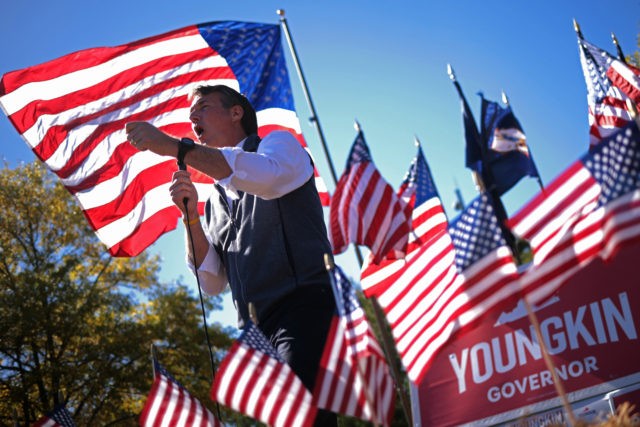The College Republicans student organization at Washington & Lee University (W&L) in Virginia was prevented from displaying campaign material referencing the Commonwealth’s upcoming gubernatorial election, according to the group’s president and the Foundation for Individual Rights in Education (FIRE).
During the school’s activities fair on September 12, the W&L College Republicans were forced to remove all materials referencing Virginia gubernatorial candidate Glenn Youngkin, including campaign signs and literature.
“Director of Student Activities Kelsey Goodwin told the group that the display violated university policy and the College Republicans had to remove all materials endorsing political candidates,” FIRE’s press release on the matter stated. “Goodwin cited the fact that W&L is a tax-exempt organization that cannot endorse political figures.”
FIRE Program Analyst Sabrina Conza, whose organization is calling on W&L to rectify the situation in light of Virginia’s November 2 gubernatorial election, stated “What is the purpose of College Republicans or College Democrats organizations if they can’t actually advocate for a Republican or a Democrat? Goodwin is wrong in her assessment of the law, and the university is wrong to remain silent after censoring students who want to take part in the political process. Now they must make it right.”
W&L College Republicans President Lillian Gillespie reportedly said that she “was shocked when I found out that we couldn’t disseminate campaign materials on campus.”
To Goodwin’s demand, Gillespie responded in an email, stating in part that it is “preposterous that the actions and opinions of a small minority of students dedicated to politics and political activity could be construed to represent the beliefs of the University as a whole.”
Gillespie, referencing the school’s “Affirmation of Freedom of Expression at Washington and Lee University” page, continued, writing:
While I recognize Washington and Lee is a private university and therefore not constitutionally beholden to preserving students’ First Amendment right to free speech, the school purports to value “the central importance of freedom of expression” in the university community. Banning individual students and student organizations from passing out campaign materials or having campaign materials on school property limits our freedom of expression.
“Washington and Lee’s interpretation that prohibitions extend to students and student organizations is either mistakenly overbroad or an intentional attempt to limit students’ freedom of expression,” Gillespie concluded.
Indeed, while Goodwin claimed that the campaign materials violated university policy due to its Internal Revenue Service (IRS) designation as a 501(c)(3) tax-exempt organization, neither university policy, nor IRS guidance appear to have been violated by Gillespie or her group.
According to W&L’s guidance on political activity, “Student political organizations (College Republicans, Young Democrats, etc.) are not prohibited from pursuing their normal activities consistent with the academic nature of their endeavors.” In order not to violate its tax-exempt status, however, the activity cannot “imply any endorsement of (or opposition to) any candidate by the University” and administrators should work to “avoid the appearance of institutional endorsement.”
Yet, the College Republicans never purported to speak for the university, and, according to FIRE, “W&L’s requirement that [College Republicans] remove campaign materials from its exhibit ignores the distinction between institutional expression and the expression of its students, who are strongly presumed to speak only for themselves.” [Emphasis added].
In a letter to W&L, FIRE furthered the point, stating:
Maintaining tax-exempt status under section 501(c)(3) does not require censorship of student political speech by campus administrators. To the contrary, W&L’s admirable commitment to protecting its students’ political expression—if the university adheres to that commitment—shields the university from liability for student political expression, because it does not constitute university participation in a political campaign by the university.
FIRE’s assertion is also backed up by IRS guidance that states, referencing 501(c)(3) organizations, that, “In order to constitute participation or intervention in a political campaign … the political activity must be that of the college or university and not the individual activity of its faculty, staff or students.”
Virginia Republican Glenn Youngkin holds less than a one-point lead over former Gov. Terry McAuliffe (D) in the state’s gubernatorial race, according to a Trafalgar Group poll. https://t.co/9KbnYUsC85
— Breitbart News (@BreitbartNews) October 17, 2021
According to FIRE, the university met with Gillespie on September 30 and October 18, only to reaffirm their position, “telling the students that they still could not advocate for their candidate.”
Washington & Lee University has not responded to a request for comment from Breitbart News as of press time.

COMMENTS
Please let us know if you're having issues with commenting.